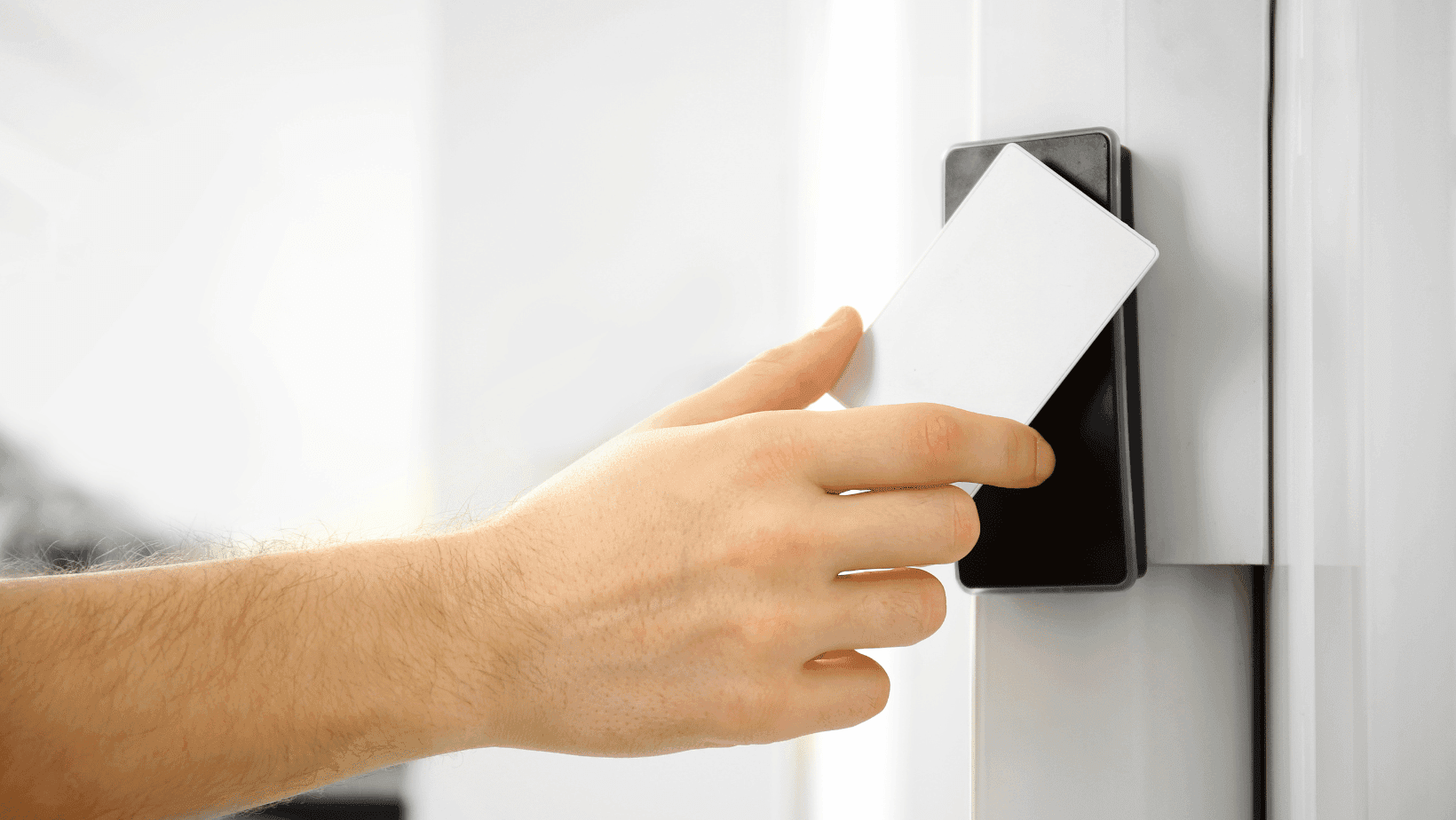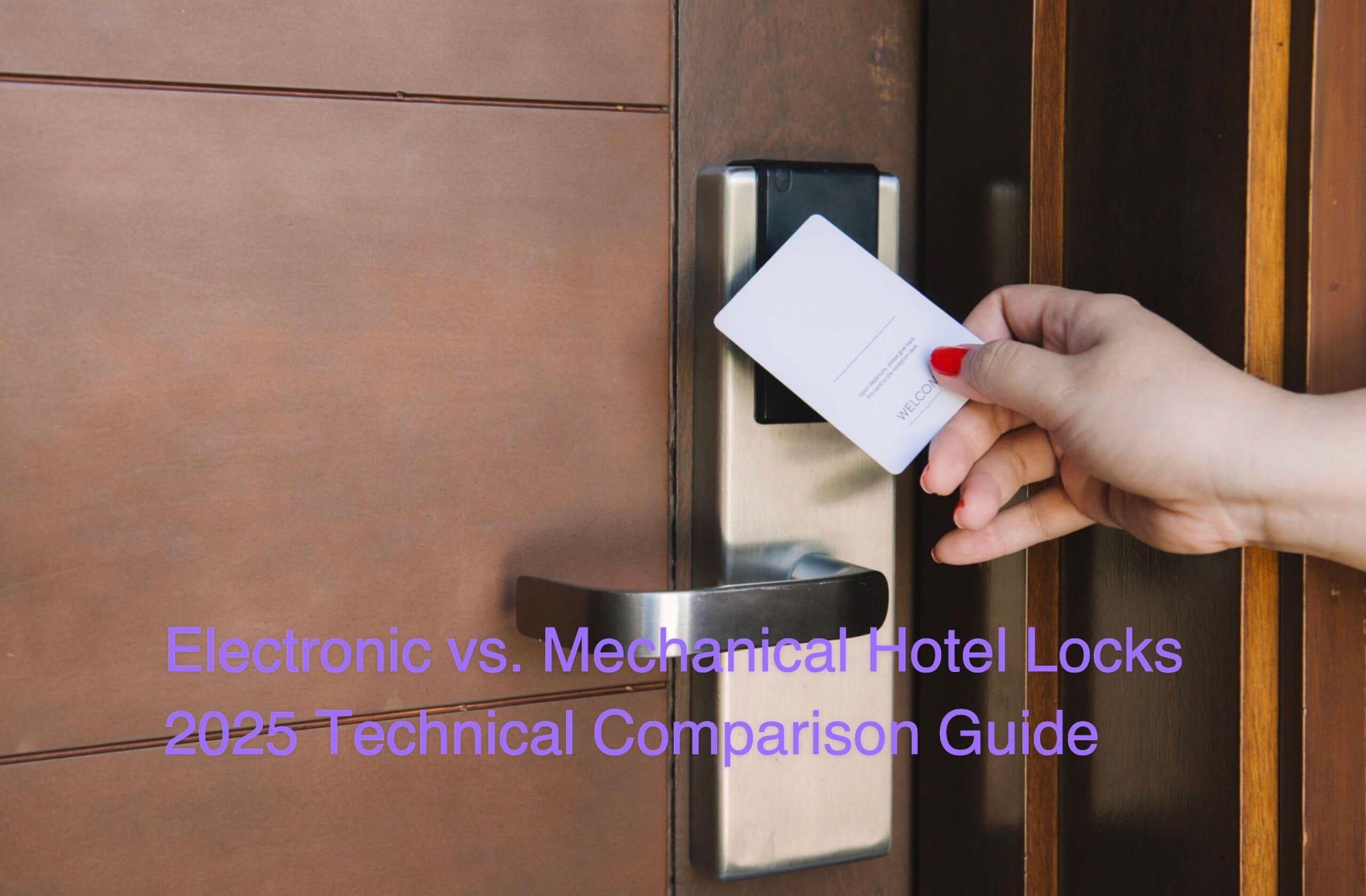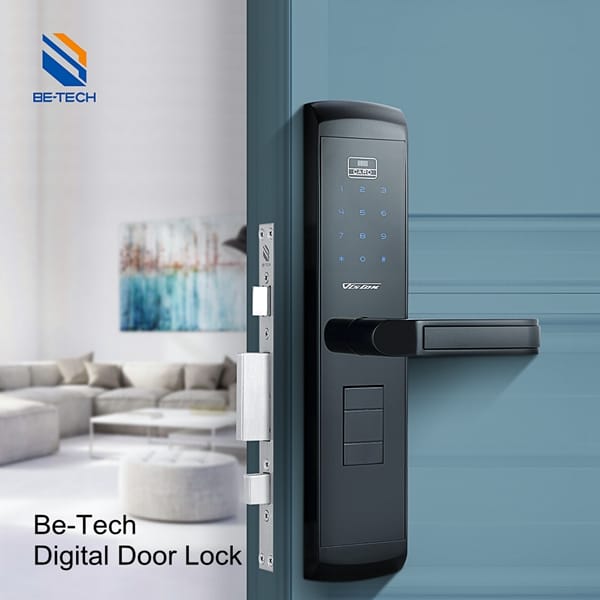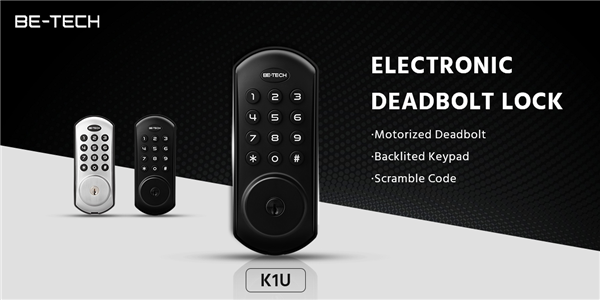In the hospitality industry, ensuring guest safety and security is of utmost importance. A reliable hotel door lock system serves as a critical component in safeguarding guests and their belongings. Not only does an effective locking solution enhance security, but it also contributes significantly to guest satisfaction by providing convenience and peace of mind.
In this comprehensive guide, we will explore essential factors to consider when selecting the best hotel door lock system for your establishment, including security features, ease of use, and technological advancements.
Understanding Hotel Door Lock Systems
Hotel door lock systems are the cornerstone of guest security and operational efficiency in the hospitality industry. As technology evolves, these systems have transformed from simple mechanical locks to sophisticated digital solutions, revolutionizing how hotels manage access control and enhance guest experiences.
The Evolution of Hotel Door Locks
Hotel door locks have come a long way from traditional key-and-lock mechanisms. Today’s advanced systems offer unparalleled security, convenience, and integration capabilities. Let’s explore the journey of hotel door lock technology and its impact on the hospitality sector.
Traditional Key Locks: The Foundation of Hotel Security
Traditional key locks, once the standard in hotels worldwide, are now considered outdated due to several limitations:
- Security Risks: Physical keys can be easily lost, stolen, or duplicated.
- Management Challenges: Key tracking and replacement are time-consuming and costly.
- Guest Inconvenience: Carrying physical keys can be cumbersome for guests.
While some budget properties still use traditional locks, they are rapidly being phased out in favor of more secure and efficient options.
Magnetic Stripe Locks: The First Digital Revolution
Magnetic stripe locks marked the first significant technological leap in hotel security:
- Improved Security: Each keycard could be encoded with unique guest information.
- Easier Management: Hotels could quickly deactivate lost cards and issue new ones.
- Enhanced Guest Experience: Keycards were more convenient than traditional keys.
However, these systems are now considered outdated due to:
- Vulnerability to demagnetization
- Susceptibility to data skimming
- Wear and tear on card readers
Traditional Key Locks vs Magnetic Stripe Locks
Traditional key locks have been the standard security solution for centuries, relying on a simple yet effective mechanical system. These locks utilize a pin-and-tumbler mechanism where a series of pins must align correctly when the right key is inserted to allow the lock to turn. Key components include the key, lock cylinder, and pins and springs. When the correct key is inserted, its unique pattern of grooves and notches pushes the pins to the proper height, enabling the lock to open. Traditional locks remain prevalent in homes, offices, and various other settings due to their reliability, durability, and familiarity.
Magnetic stripe locks, also known as magstripe locks, operate on a different principle, utilizing electronic components instead of purely mechanical ones. These modern security devices feature a magnetic strip on a keycard that contains encoded information. When the card is swiped or inserted into the lock’s reader, it cross-checks the information on the card with its programmed data. If there’s a match, the door unlocks. Magnetic stripe locks offer significant advantages such as easy integration with access control systems, real-time monitoring capabilities, and the ability to quickly change or revoke access permissions. However, they have some drawbacks, including the potential for demagnetization, vulnerability to power outages, and the need for regular maintenance.
When comparing traditional key locks and magnetic stripe locks, each system has its unique strengths and weaknesses. Traditional locks are more reliable during power outages, have a lower initial cost, and are familiar to most users. They also don’t require any power source to function, making them ideal for remote locations or areas with unreliable electricity. On the other hand, magnetic stripe locks offer enhanced security features, easier access control management, and the convenience of keyless entry. They excel in environments requiring frequent access changes or detailed entry logs. However, they are dependent on power and may require more technical expertise for maintenance and troubleshooting.
| Feature | Traditional Key Locks | Magnetic Stripe Locks |
|---|---|---|
| Power Source | None required | Electricity dependent |
| Security Level | Good, but can be picked | High, difficult to bypass |
| Access Control | Limited | Easily manageable |
| Initial Cost | Lower | Higher |
| Maintenance | Minimal | May require more |
| Convenience | Requires physical key | Keyless entry possible |
| Scalability | Limited | Highly scalable |
| Audit Trail | Not available | Detailed logs available |
The choice between traditional key locks and magnetic stripe locks depends on specific needs, security requirements, and operational circumstances. Traditional locks are better suited for situations where reliability, simplicity, and cost-effectiveness are paramount, such as residential properties or small businesses. Magnetic stripe locks offer advanced features and easier access management, making them ideal for larger facilities, corporate environments, or businesses with frequent user changes and high-security demands. Consider factors like budget, security level, scalability, and maintenance capabilities when deciding between these two lock systems.
Modern Hotel Door Lock Systems
RFID Locks: Contactless Convenience
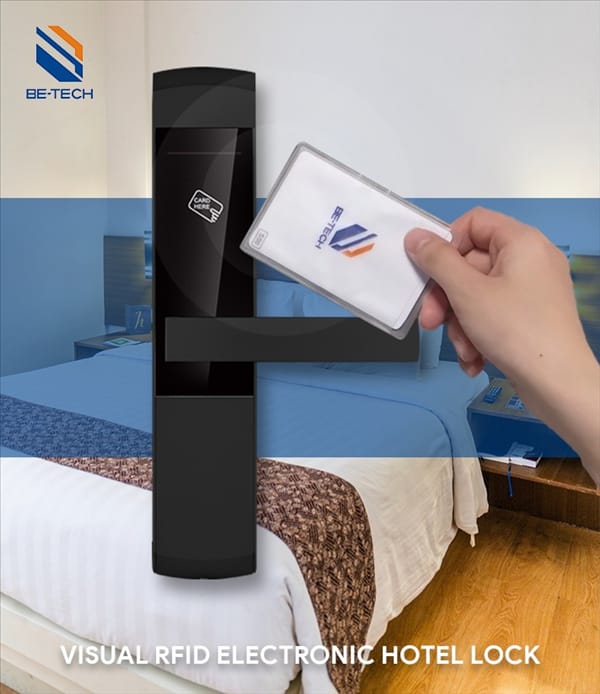
Radio Frequency Identification (RFID) locks have become increasingly popular in hotels due to their numerous advantages:
- Enhanced Security: RFID chips are more resistant to tampering and data theft.
- Contactless Operation: Guests can unlock doors by simply holding the card near the reader.
- Durability: RFID cards are more durable than magnetic stripe cards.
- Integration Capabilities: These systems can be easily integrated with hotel management software.
According to a recent hospitality technology survey, 68% of hotels now use RFID locks, citing improved security and guest satisfaction as primary benefits.
Biometric Locks: The Future of Personalized Security

Biometric locks represent the cutting edge of hotel security technology:
- Unparalleled Security: Uses unique physical characteristics for authentication.
- Convenience: No need for keys or cards.
- Audit Trail: Provides detailed access logs for enhanced security monitoring.
However, implementation challenges include:
- Higher costs
- Privacy concerns among some guests
- Need for backup systems in case of biometric reader failure
Mobile Access Locks: The Smartphone Revolution

Mobile access locks are rapidly gaining popularity, allowing guests to use their smartphones as digital keys:
- Seamless Guest Experience: Enables contactless check-in and room access.
- Operational Efficiency: Reduces front desk workload and keycard management costs.
- Enhanced Security: Utilizes encryption and tokenization for secure access.
A study by Hotel Management International found that hotels implementing mobile key solutions saw a 7% increase in guest satisfaction scores.
RFID Locks vs Biometric Locks
RFID locks are electronic access control devices that use radio frequency identification technology to grant or deny entry. These systems consist of an RFID reader, RFID tags (usually in the form of key cards or fobs), and an electronic locking mechanism. When a user presents their RFID tag to the reader, it sends a radio signal to authenticate the credential. If authorized, the lock opens. RFID locks are widely used in hotels, office buildings, and residential complexes due to their convenience and ease of management. They allow for quick access without the need for physical keys and can be easily programmed to grant or revoke access rights.
Biometric locks, on the other hand, use unique physical or behavioral characteristics to identify and authenticate users. Common biometric features include fingerprints, facial recognition, iris scans, and voice patterns. These locks work by scanning and storing the biometric data of authorized users. When someone attempts to gain entry, the system compares their biometric input against the stored data. If there’s a match, access is granted. Biometric locks offer a high level of security as they’re extremely difficult to forge or replicate. They eliminate the need for physical keys or access cards, reducing the risk of lost or stolen credentials. However, they can be more expensive to implement and may face challenges in certain environments or with certain users.
When comparing RFID locks and biometric locks, both have their strengths and weaknesses. RFID locks are generally more affordable, easier to implement on a large scale, and allow for quick access. They’re also more familiar to most users and can be easily integrated with existing security systems. However, RFID tags can be lost, stolen, or duplicated, potentially compromising security. Biometric locks offer superior security as they rely on unique physical traits that are difficult to replicate. They also eliminate the need for carrying access cards or remembering PINs. However, biometric systems can be more expensive, may have issues with false rejections, and raise privacy concerns regarding the storage of personal biometric data.
| Feature | RFID Locks | Biometric Locks |
|---|---|---|
| Security | Good, but cards can be lost or stolen | Excellent, difficult to forge |
| Convenience | High, quick access with cards/fobs | Very high, no need for cards or keys |
| Cost | Generally lower | Usually higher |
| Scalability | Excellent for large-scale deployment | Can be challenging for large systems |
| Privacy Concerns | Minimal | Potential issues with biometric data storage |
| Reliability | Very reliable, but depends on card integrity | Can have issues with false rejections |
The choice between RFID locks and biometric locks depends on specific needs, budget, and security requirements. RFID locks are a cost-effective and scalable solution for many applications, while biometric locks offer unparalleled security for high-risk areas or situations where maximum protection is necessary.
RFID Locks vs Mobile Access Locks
RFID locks utilize radio frequency technology to authenticate and manage access. These locks operate by reading RFID tags or cards that emit radio waves detected by the lock’s reader. The core components of an RFID lock system include an RFID reader, RFID tags or cards, a control unit, and a locking mechanism. RFID locks are widely used in various settings, including residential homes, hotels, offices, and educational institutions. They offer keyless entry, eliminating the need for traditional keys and providing a convenient way to manage access control.
Mobile access locks leverage smartphones and modern communication technologies such as Near Field Communication (NFC) and Bluetooth Low Energy (BLE) to provide secure access. These locks can be controlled remotely via a smartphone app, allowing users to lock and unlock doors from anywhere. Mobile access locks offer enhanced security features, including strong encryption protocols and biometric authentication methods like fingerprint scanning or facial recognition. They also provide the convenience of using a smartphone as a credential, eliminating the need for physical access cards or key fobs.
When comparing RFID locks and mobile access locks, both systems have their strengths and weaknesses. RFID locks are more established and widely used, offering a reliable and cost-effective solution for access control. They are relatively easy to implement and manage, especially in large-scale applications. However, RFID technology is susceptible to cloning and unauthorized reading, which can compromise security. Mobile access locks, while newer, offer higher security through advanced encryption and authentication methods. They provide greater flexibility in terms of remote management and customization of access permissions. However, mobile access systems may be more expensive to implement and require users to have compatible smartphones.
| Feature | RFID Locks | Mobile Access Locks |
|---|---|---|
| Technology | Radio Frequency Identification | NFC, BLE, Smartphone apps |
| Security | Moderate (susceptible to cloning) | High (strong encryption) |
| Convenience | Keyless entry with cards/fobs | Smartphone-based access |
| Remote Management | Limited | Extensive |
| Cost | Generally lower | Higher initial investment |
| Scalability | Highly scalable | Flexible but may require infrastructure upgrades |
The choice between RFID locks and mobile access locks depends on specific needs and priorities. RFID locks offer a tried-and-tested solution with wide compatibility and lower costs, making them suitable for many applications. Mobile access locks provide enhanced security and convenience, particularly appealing to tech-savvy users and environments requiring advanced access control features. As technology continues to evolve, mobile access systems are likely to become increasingly prevalent, potentially offering the best of both worlds in terms of security and user experience.
Biometric Locks vs Mobile Access Locks
Biometric locks are cutting-edge security systems that leverage unique physical or behavioral traits for user authentication. These advanced devices typically employ fingerprint recognition, facial recognition, iris scanning, or voice patterns to grant access to secure areas. Widely adopted in high-security environments like banks, medical facilities, and government buildings, biometric locks operate by scanning and matching specific biometric data against stored profiles. For example, a fingerprint door lock scans and compares the user’s fingerprint to its database, unlocking upon a successful match. The key advantages of biometric locks include enhanced security, user convenience, and elimination of physical keys or complex passwords.
Mobile access locks, in contrast, harness the power of smartphone applications for access control. These cloud-based systems store user data and access permissions remotely. The unlocking process involves users selecting the desired access point from their app, sending an open request to the cloud for validation, and receiving approval to unlock. Mobile access locks offer several benefits:
- Remote access capabilities: Homeowners can control locks from anywhere using a smartphone.
- Smart home integration: Seamless connectivity with security cameras, doorbells, and other smart devices.
- Flexible user management: Easy creation and management of multiple user codes or access privileges.
When comparing these two lock types, each presents distinct advantages and limitations:
| Feature | Biometric Locks | Mobile Access Locks |
|---|---|---|
| Security Level | Very High | High |
| Convenience | High | Very High |
| Remote Access | Limited | Yes |
| Cost | Higher | Lower |
| Multiple User Management | Limited | Easy |
| Integration with Smart Home | Limited | Extensive |
Biometric locks excel in security due to the uniqueness of biometric data, making them extremely difficult to breach. They eliminate risks associated with lost or stolen credentials, making them ideal for high-security environments. However, they can be costly to implement, may experience occasional misreadings or delays, and lack remote authorization capabilities.
Mobile access locks, while potentially more vulnerable to hacking, offer superior flexibility and convenience. They enable remote access control, effortless management of multiple users, and seamless integration with smart home ecosystems. Generally more cost-effective, mobile access locks also allow for easy updates or modifications to access permissions.
The choice between biometric and mobile access locks ultimately depends on specific security requirements and user preferences. For high-security settings where convenience is secondary, biometric locks may be the optimal choice. In multi-family communities or situations prioritizing flexibility and remote access, mobile access locks offer significant advantages. The final decision should be based on a careful evaluation of security needs, budget constraints, and desired features.
Assessing Hotel Requirements for Optimal Door Lock Systems
Selecting the right hotel door lock system begins with a comprehensive assessment of your property’s unique characteristics and guest profile. This crucial evaluation ensures you choose a solution that perfectly aligns with your operational needs, budget constraints, and guest expectations.
Property Size and Layout: Tailoring Security to Scale
The physical attributes of your hotel significantly influence the ideal door lock system:
- Large-scale properties with multiple buildings often require robust, scalable solutions that can manage complex access control across diverse areas.
- Boutique hotels may benefit from streamlined, standalone systems that offer simplicity without sacrificing security.
According to a 2023 hospitality security report, 78% of hotels with over 200 rooms opt for centralized access control systems, highlighting the importance of scalability for larger properties.
Guest Demographics: Meeting Diverse Traveler Needs
Understanding your target audience is paramount when selecting lock technology:
- Business travelers typically prioritize:
- Mobile access for seamless check-ins
- Keyless entry options
- Integration with loyalty programs
- Families and leisure guests often value:
- Enhanced security features (e.g., anti-tampering alerts)
- User-friendly interfaces suitable for all ages
- Durable designs for frequent use
A recent survey found that 65% of business travelers prefer hotels offering mobile key technology, underscoring the importance of aligning your system with guest preferences.
Existing Infrastructure: Ensuring Seamless Integration
Evaluate your current hotel systems to guarantee compatibility:
- Property Management System (PMS) integration capabilities
- Network infrastructure readiness for cloud-based or IoT-enabled locks
- Legacy system compatibility or replacement needs
“Compatibility with existing hotel technology is crucial for a smooth transition to new lock systems,” notes Sarah Johnson, CTO of HotelSafe Solutions. “Always request detailed integration plans from potential vendors.”
By carefully considering these factors—property characteristics, guest demographics, and existing infrastructure—you’ll be well-equipped to select a door lock system that enhances security, streamlines operations, and exceeds guest expectations.
Essential Considerations for Selecting Hotel Door Lock Systems
When choosing a hotel door lock system, several key factors demand careful consideration to ensure optimal security, efficiency, and guest satisfaction. Let’s explore these crucial elements:
Security and Data Protection: Your Top Priority
Robust security measures are non-negotiable for protecting guests and their data. Seek systems offering:
- Advanced encryption (e.g., AES 256-bit)
- Multi-factor authentication
- Comprehensive access controls
- Compliance with data protection regulations (GDPR, PCI DSS)
According to a 2023 hospitality security report, hotels using advanced encryption techniques experienced 75% fewer security breaches.
Seamless PMS Integration for Streamlined Operations
Choose a lock system that integrates effortlessly with your property management system (PMS) to:
- Enable real-time, bi-directional communication
- Automate check-in and room assignment processes
- Reduce manual errors and improve staff efficiency
A recent case study showed that hotels with fully integrated PMS-lock systems reduced check-in times by 40% and key-related issues by 60%.
Scalability: Future-Proofing Your Investment
Opt for a scalable and upgradable solution that:
- Offers modular designs for easy expansion
- Supports software updates to address evolving security threats
- Accommodates various lock types for future renovations
Reliable Vendor Support and Comprehensive Warranty
Prioritize vendors providing:
- 24/7 technical assistance
- Regular maintenance plans
- Extended warranties covering both hardware and software
Smart Technology Integration for Enhanced Guest Experiences
Look for systems that seamlessly integrate with:
- Mobile access solutions
- In-room smart controls
- Energy management systems
A recent survey found that 72% of guests prefer hotels offering mobile key technology, highlighting the importance of smart integrations.
By carefully weighing these factors, you’ll select a door lock system that not only meets current needs but also positions your hotel for future success in the evolving hospitality landscape.
Evaluating Hotel Lock Providers: Key Factors for Informed Decision-Making
When comparing hotel lock providers, consider these critical factors to select a system that enhances guest experiences and operational efficiency:
Advanced Features and Seamless Integration
Prioritize providers offering:
- Keyless entry options (mobile access, RFID, biometrics)
- Remote management capabilities
- Comprehensive audit trails
- Integration with energy management and in-room controls
According to a 2023 hospitality tech survey, hotels implementing mobile access solutions saw a 25% increase in guest satisfaction scores.
Cost-Effectiveness and Long-Term ROI
Conduct a thorough cost-benefit analysis, considering:
- Initial installation expenses
- Ongoing maintenance costs
- Potential operational savings
- Impact on guest satisfaction and loyalty
A case study of Luxury Hotel Group revealed a 15% reduction in operational costs within one year of implementing an advanced lock system.
Real-World Performance and Sustainability
Evaluate provider reliability through:
- Customer reviews and testimonials
- Detailed case studies from similar properties
- Environmental impact assessments (energy efficiency, material sourcing)
Recent data shows that 72% of travelers prefer eco-friendly accommodations, highlighting the importance of sustainable technology choices.
By carefully weighing these factors, you’ll select a hotel lock system that not only meets current needs but also positions your property for future success in the evolving hospitality landscape.
Enhancing Guest Experiences
Ultimately, the goal of implementing a new hotel door lock system is to provide a superior guest experience while ensuring security and convenience. Consider solutions that offer features such as mobile access, keyless entry, and contactless check-in/check-out processes. These features not only streamline the guest journey but also cater to the growing demand for touchless and contactless experiences, which have become increasingly important in the post-pandemic era.
Vendor Expertise and Support
When selecting a hotel door lock system provider, consider their expertise and industry experience. Look for vendors with a proven track record in the hospitality industry and a deep understanding of the unique challenges and requirements faced by hotels. Additionally, evaluate the level of support and training they offer, as well as their commitment to ongoing product development and innovation. A knowledgeable and responsive vendor can be a valuable partner in ensuring the successful implementation and long-term maintenance of your door lock system.
By carefully considering these factors and conducting a thorough evaluation, you can select the best hotel door lock system that meets your specific needs, enhances guest experiences, and provides a solid return on investment.
Leading Hotel Door Lock System Providers
To help you in your decision-making process, here are some of the leading hotel door lock system providers in the market:
- Be-tech Lock: Betech lock is a renowned global provider of access control solutions, offering a comprehensive range of electronic hotel locks under the Be-tech Lock and Be-tech IOT brands. Their products include RFID locks, mobile access solutions, and integrated systems for guest room management and energy efficiency.
- ASSA ABLOY Global Solutions: ASSA ABLOY is a leading manufacturer of door opening solutions, including electronic hotel locks under the VingCard brand. Their offerings include RFID locks, mobile access solutions, and integrated systems for property management and energy management.
- Salto Systems: Salto Systems is a pioneer in the development of wire-free electronic lock systems for the hospitality industry. Their solutions include RFID locks, mobile access, and cloud-based access control systems for hotels and resorts.
- Onity: Onity is a well-established provider of electronic locking systems for the hospitality industry. Their product portfolio includes RFID locks, mobile access solutions, and integrated systems for guest room management and energy conservation.
- Kaba: Kaba, now part of the Dormakaba Group, offers a range of electronic hotel locks, including RFID locks, mobile access solutions, and integrated systems for guest room management and energy efficiency.
These providers offer a wide range of solutions tailored to the unique needs of the hospitality industry, ensuring that hotels can find the best fit for their specific requirements.
In conclusion, choosing the best hotel door lock system is a critical decision that can significantly impact guest experiences, operational efficiency, and overall security. By carefully assessing your hotel’s requirements, considering key factors such as security, scalability, and integration capabilities, and evaluating leading providers, you can make an informed choice that aligns with your property’s goals and provides a solid return on investment.


